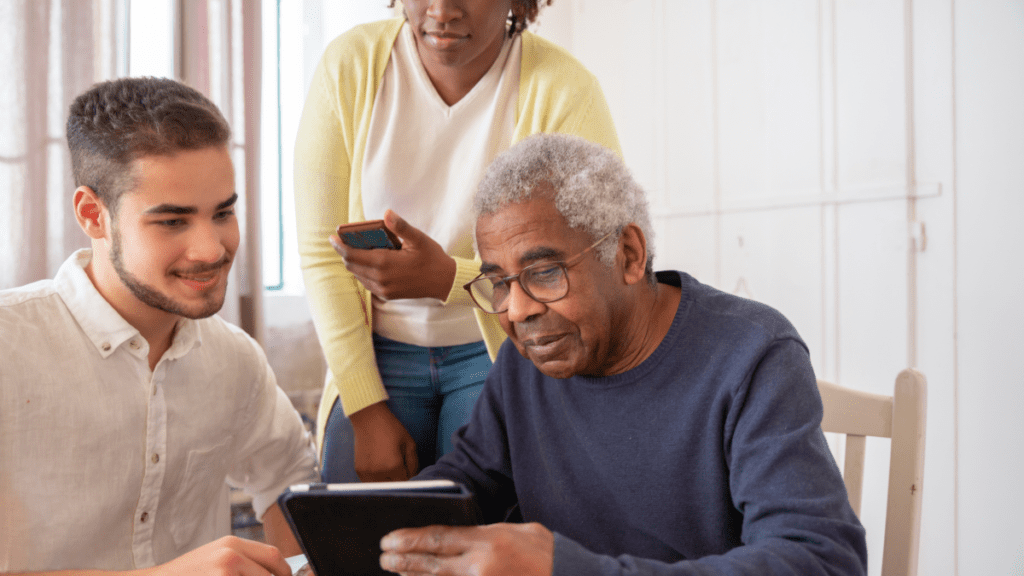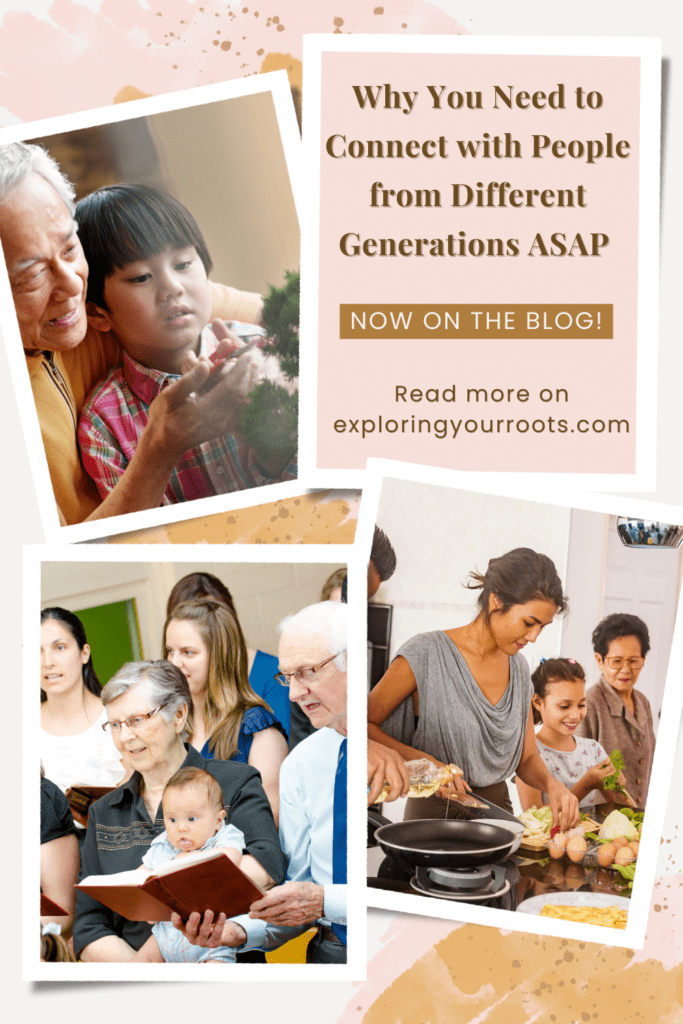Intergenerational relationships are connections between people of different ages who share common interests, values, or goals. They can be formal or informal, planned or spontaneous, short-term or long-term. Activities such as playing games, reading books, gardening, cooking, volunteering, or simply chatting are great for forging new relationships. Learning new skills, exchanging ideas, sharing stories, and offering support also provide opportunities for people of different generations to bond in meaningful ways.
Intergenerational relationships are not only enjoyable and rewarding, but they are also important for our society. They can help us overcome some of the challenges that we face in our communities, such as social isolation, loneliness, ageism, and lack of diversity. They can also enhance our physical health, emotional wellbeing, social connections, and personal growth.
In this article, we will explore some of the positive impacts and benefits of intergenerational relationships, as well as some strategies and examples for building them. We will also show you how intergenerational relationships can strengthen society by building bridges across ages.
The Positive Impact of Intergenerational Relationships
One of the rising issues in our communities is social isolation and loneliness. According to a recent report by the National Academies of Sciences, Engineering, and Medicine, more than one-third of adults aged 45 and older feel lonely, and nearly one-fourth of adults aged 65 and older are considered to be socially isolated. These conditions can have serious consequences for our health and quality of life. They can increase the risk of depression, anxiety, cognitive decline, heart disease, stroke, and premature death.
Intergenerational relationships can counter these issues and enhance our overall wellbeing. By interacting with people from different age groups, we can expand our social networks and reduce our feelings of loneliness. We can also gain a sense of belonging and purpose in our communities. Research has shown that intergenerational programs can improve the mental health and life satisfaction of both older and younger participants. They can also foster mutual respect and understanding between generations.
Intergenerational relationships also hold the power to bridge the gap between age groups, creating a harmonious interplay between wisdom gained from experience and the vibrant energy of youth. In a world where digital interactions sometimes overshadow face-to-face connections, the significance of fostering connections across generations cannot be overstated. These relationships not only enrich individual lives but also contribute to building stronger, more resilient communities.
What Are the Benefits of Intergenerational Relationships?
There are many benefits that intergenerational relationships can provide for both older and younger individuals. Here are some of the main ones:
Physical Health and Emotional Wellbeing
Intergenerational relationships can have positive effects on our physical health and emotional wellbeing. Research has shown that intergenerational programs can improve the mental health and life satisfaction of both older and younger participants. They can also foster mutual respect and understanding between generations.
Studies have found that older adults who interact with young people tend to have better physical functioning, lower blood pressure, lower levels of inflammation, and lower mortality rates than those who do not. They also tend to have higher levels of happiness, optimism, self-esteem, and self-efficacy.
Younger individuals can also benefit from intergenerational relationships in terms of their physical health and emotional wellbeing. They can learn healthy habits and behaviors from older adults, such as eating well, exercising regularly, managing stress, and avoiding substance abuse. They can also develop positive attitudes and coping skills that can help them deal with challenges and difficulties in life.
The exchange of ideas, stories, and experiences rejuvenates the spirit and contributes to a more positive outlook on life. Intergenerational relationships can help combat mental health challenges and provide a renewed sense of purpose and belonging.
Building Valuable Connections

Intergenerational relationships create a tapestry of connections that transcend age. Both older adults and young people benefit from the sense of value and inclusivity that these bonds foster. The wisdom and guidance provided by older individuals are cherished, while the fresh perspectives and innovation brought by the younger generation invigorate the community.
Older adults can offer younger individuals guidance, wisdom, support, and advice based on their life experiences. They can also serve as role models, mentors, allies, and friends who can inspire them to achieve their goals and dreams. Younger individuals can offer older adults companionship, affection, enthusiasm, and appreciation for their contributions. They can also serve as helpers, advocates, collaborators, and co-creators who can assist them with their needs and interests.
There are many activities that can promote meaningful connections between older and younger individuals. Some examples are:
- Reading stories or books together
- Playing games or puzzles together
- Doing arts and crafts together
- Cooking or baking together
- Gardening or planting together
- Volunteering or fundraising together
- Learning or teaching a new skill together
- Traveling or exploring together
Learning and Teaching New Skills

Intergenerational relationships provide learning opportunities for both older and younger individuals. Older adults can learn new skills from younger individuals, such as using technology, speaking a foreign language, or playing a musical instrument. Younger individuals can learn new skills from older adults, such as knitting, sewing, or woodworking. Learning new skills can enhance our cognitive abilities, creativity, and self-confidence.
There are many real-life instances of knowledge exchange between older adults and young people. Some examples are:
- Older adults teaching young people how to make traditional dishes or crafts
- Young people teaching older adults how to use social media or online platforms
- Older adults sharing their professional expertise or career advice with young people
- Young people sharing their academic knowledge or school projects with older adults
- Older adults and young people co-creating a product, a service, or a solution for a common problem
Every interaction becomes an opportunity for growth. Intergenerational relationships facilitate the sharing of skills, knowledge, and experiences.
Passing on Life Lessons and Stories
Our lives are composed of stories that deserve to be told and cherished. Intergenerational relationships provide a platform for passing on these life lessons and stories to future generations. The transmission of personal experiences, historical accounts, and cultural traditions bridges the gap between the past and the present, preserving the legacy of families and communities.
Older adults can pass on their life lessons and stories to younger generations, such as their family history, cultural traditions, personal values, or memorable events. They can also pass on their wisdom and insights that can help younger generations navigate their own life journeys. Younger generations can listen to and appreciate the life lessons and stories of older adults. They can also record and preserve them for future generations.
Documenting Life Experiences
There are many ways that older adults can share their life experiences with younger generations. Some examples are:
- Writing a memoir, a diary, or a letter
- Making a scrapbook, a collage, or a photo album
- Recording an audio or video interview
- Creating a family tree, a timeline, or a map
- Making a gift, a keepsake, or a legacy
For tips on helping seniors research and document their stories, visit our article Best Tools for Genealogy Research, Organizing, & Writing. For an inexpensive workbook that can be downloaded and used for working with a senior’s story, check out Memorygrabber.
Embracing Aging
Ageism is a pervasive issue in society, often leading to negative stereotypes and perceptions about aging. It can affect both older and younger individuals in various aspects of their lives, such as employment, education, health care, media, and social interactions. Ageism can also affect how we view ourselves and our potential as we age.
Intergenerational relationships challenge these stereotypes by fostering empathy and understanding. Young people interacting with older adults gain a deeper appreciation for the richness of life experiences, while older adults are inspired by the enthusiasm and potential of the younger generation.
Intergenerational relationships can also help us shape our own perspectives on aging. By seeing the positive aspects of aging, such as the opportunities for growth, learning, and contribution, we can embrace aging as a natural and meaningful part of life. We can also celebrate the achievements, strengths, and joys of each stage of life.
Strategies for Building Intergenerational Relationships
There are many strategies that we can use to build intergenerational relationships in our lives. Here are some of them:
Intergenerational Playgroups
Creating spaces for intergenerational playgroups opens the door to shared laughter and meaningful interactions. Activities like storytelling, art projects, and outdoor adventures provide opportunities for both young and old to connect on a personal level.
Intergenerational playgroups are settings where older adults and young children (usually aged 0 to 5) come together for regular sessions of play and interaction. They are often hosted by aged care facilities, retirement villages, or community centers, and facilitated by staff or volunteers. Intergenerational playgroups have many benefits for both older adults and young children. They can:
- Enhance the physical, cognitive, and social development of young children
- Reduce the risk of isolation, boredom, and depression in older adults
- Foster mutual empathy, respect, and affection between generations
- Provide support and respite for parents and caregivers
Some ideas for activities that can be conducted in intergenerational playgroups are:
- Singing songs or nursery rhymes together
- Playing with toys or puppets together
- Doing yoga or stretching together
- Making cards or decorations together
- Having a picnic or snack together
Technology and Formal Programs
Technology can be a useful tool to bridge the generation gap and facilitate intergenerational relationships. There are many ways that we can use technology to connect with people from different age groups. We can:
- Use video calls or messaging apps to communicate with distant relatives or friends
- Join online communities or forums that share common interests or hobbies
- Play online games or quizzes that involve collaboration or competition
- Watch online videos or podcasts that feature intergenerational topics or perspectives
- Use online platforms or apps that match older adults and young people for mentoring or tutoring
Formal programs are another way to build intergenerational relationships in our communities. There are many organizations that offer intergenerational programs that aim to address specific issues or goals. Some examples are:
- Generations United, which advocates for policies and practices that support intergenerational collaboration and exchange
- AARP Experience Corps, which engages older adults as tutors and mentors for elementary school students who struggle with reading
- Encore.org, which mobilizes older adults to use their skills and experience to serve social causes
- Cyber-Seniors, which trains young people to teach older adults how to use technology
- Roots & Shoots, which empowers young people to take action for animals, people, and the environment with the guidance of older mentors
Real-life Examples and Success Stories

There are many real-life examples and success stories of communities or organizations that have successfully implemented intergenerational programs. Here are some of them:
- The Intergenerational Learning Center, which is a preschool located within a nursing home in Seattle, Washington. The center brings together children and older adults for daily activities such as music, art, storytelling, and exercise. The program has been shown to improve the physical and mental health of the residents, as well as the social and emotional development of the children.
- The Grandfriends Project, which is an initiative that connects older adults who live alone with young families who live nearby in New Zealand. The project aims to create mutually beneficial relationships that reduce loneliness and isolation, enhance wellbeing and happiness, and foster a sense of community.
- The Intergenerational Schools, which are a network of public charter schools in Cleveland, Ohio. The schools use an innovative curriculum that integrates older adults as mentors, tutors, and volunteers for the students. The schools have been recognized for their academic excellence, diversity, and inclusion.
- The St. Ann Center for Intergenerational Care, which is a facility that provides day care services for children and adults of all ages and abilities in Milwaukee, Wisconsin. The center offers a variety of intergenerational activities that promote interaction, learning, and fun. The center also provides health care, education, and social services for the community.
- The Magic Me Project, which is an organization that runs intergenerational arts projects in London, UK. The organization brings together people of different ages and backgrounds to collaborate on creative projects such as theater, music, photography, and storytelling. The organization aims to challenge stereotypes, celebrate diversity, and build connections.
Steps to Promote Intergenerational Relationships
If you are inspired by these examples and want to promote intergenerational connections in your own life or community, here are some practical tips that you can follow:
- Start with your own family or circle of friends. Reach out to your relatives or acquaintances who are from a different generation than you. Ask them about their interests, hobbies, or passions. Share your own stories, experiences, or goals. Find common ground or learn something new from each other.
- Join or create an intergenerational group or event. Look for opportunities to meet people from different age groups who share your interests or values. You can join an existing group or event in your area, such as a book club, a gardening club, or a volunteer project. Or you can create your own group or event by inviting people from your neighborhood, school, or workplace.
- Use technology to connect with people from different generations. Technology can be a great way to stay in touch with people who live far away or have different schedules than you. You can use video calls, messaging apps, or social media to communicate with them regularly. You can also use online platforms or apps that match you with people from different generations who have similar interests or needs.
- Participate in or support an intergenerational program. There are many organizations that offer intergenerational programs that you can join or support. You can search online for intergenerational programs in your area or contact local agencies or institutions that serve older adults or young people. You can also donate your time, money, or resources to these programs.
Generations United has created a FREE TOOLKIT based on decades of experience gathered by the Intergenerational Center at Temple University to help other agencies, institutions, and educational facilities start a program of their own.
Bridging Age, Enriching Hearts
Intergenerational relationships are connections that can enrich your life and strengthen society. They can provide you with many benefits, such as improved physical health, emotional wellbeing, social connections, and personal growth. They can also help you overcome some of the challenges that you face in your community, such as social isolation, loneliness, ageism, and lack of diversity.
Intergenerational relationships can also build bridges across ages by fostering mutual respect, understanding, and appreciation between generations. They can also create a harmonious interplay between wisdom gained from experience and the vibrant energy of youth.
We hope that this article has inspired you to take small steps to foster connections between generations for a stronger, more inclusive society. Remember that every interaction counts and every relationship matters. You never know what you can learn or gain from someone who is from a different generation than you.
Learn more about the benefits of intergenerational programs in this Generations United Fact Sheet.





1 Comment
I really like reading through a post that can make men and women think. Also, thank you for allowing me to comment!